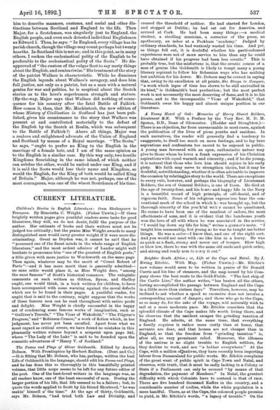The Poems and Plays of Oliver Goldsmith. Edited by Austin
Dobson. With Frontispiece by Herbert Renton. (Dent and Co.) —It is fitting that Mr. Dobson, who has, perhaps, written the best Life of Goldsmith in the language, should edit his Poems and Plays, and he has done this so thoroughly in this beautifully printed -volume, that little scope seems to be left for any future editor of the poet. One of the best-loved writers in the language was, as all readers know, one of the least successful of men. During the larger portion of his life, that life seemed to be a failure ; but, to quote the words applied to Scott by his friend Shortresd, "he was makin' himsell a' the time." At the age of thirty, Goldsmith, says Mr. Dobson, "had tried both Law and Divinity, and crossed the threshold of neither. He had started for London, and stopped at Dublin ; he had set out for America, and arrived at Cork. He had been many things :—a medical student, a strolling musician, a corrector of the press, an apothecary, an usher at a Peckham academy.' Judged by ordinary standards, he had wantonly wasted his time. And yet, as things fell out, it is doubtful whether his parti-coloured experiences were not of more service to him than any he could have obtained if his progress had been less erratic." This is probably true, but the misfortune is, that the erratic course of a man of genius like Goldsmith is likely to tempt many a young literary aspirant to follow his Bohemian ways who has nothing but ambition for his dower. Mr. Dobson may be correct in saying that, owing to its excellence at all points, She Stoops to Conquer, "a work which lapse of time has shown to be still unrivalled in its kind," is Goldsmith's best production; but the most perfect work is not necessarily the most deserving of fame, and it is to his poems, and to the incomparable "Vicar of Wakefield," that Goldsmith owes his happy and almost unique position in our literature.
































 Previous page
Previous page